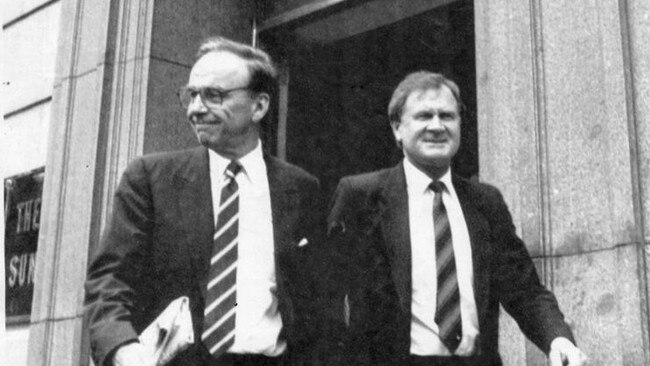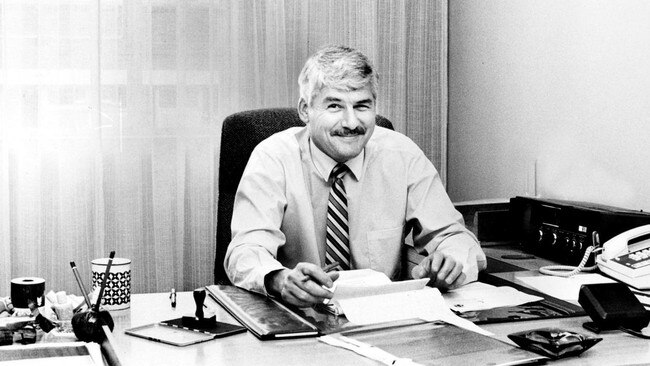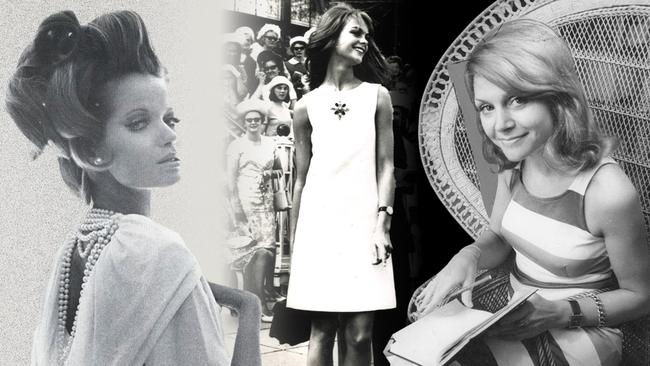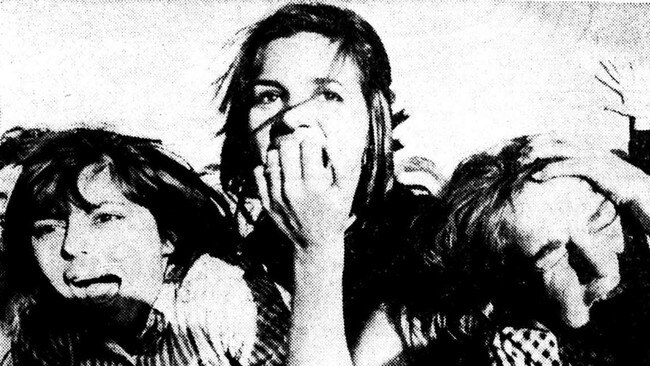‘Imagine how much poorer our national conversation would be each day without The Australian’

Kicking off the coverage was Alan Howe’s look back at our sensational Sixties, when young protesters found lungs on the Vietnam war; a prime minister went missing; and people landed on the moon. Veteran Pat looked back:
“The first edition of the Australian was issued free to us as cadets at the Royal Military College Duntroon. It was good reading and soon we were reading about ourselves as we served in Vietnam, and then the aftermath when we were pilloried for having served. I particularly felt sadness for the conscripts who served so well and who were vilified upon their return to Australia. Our dwindling lot still gather each month.”
Richard reckoned: “When you think of defence matters, the economy, children’s rights, energy security and planning, university and other education matters, arts and science coverage, am I wrong to claim that The Australian is the best newspaper in the world? And of course, against the ‘lumpen intelligentsia’ screeching about ‘the Murdoch press.’ Where would we be without it, comrade?”
Alistair recalled: “After demob from British army, myself and young family arrived in Australia, where I bought my first copy of the Australian in March 1969. We have never looked back.”
Ubique saluted: “107 Bty as GPO then 108 as FO supporting 2/4 RAR. Later BK of 101 and BC 7 Fd here in Perth. Once a gunner…”
Charles missed the 6os: “We had the best music ever. Nothing has matched it since, and Australia certainly punched above its weight.”
StephenW said: “It is amazing that Menzies was the last PM to voluntarily retire in Australia and that was 1966. One PM died all the others have either been defeated or removed by their own party.”
Theresa argued: “Yes we protested but we didn’t intimidate anyone, we didn’t stop Universities from functioning, or interfere in people’s lives, we didn’t promote anti-Semitism. We actually had a well equipped army too. Yes times were good and we had a sense of pride in our country. Australia was considered ‘the lucky country’. What happened?”

No nostalgia from John: “So times were good in the 1960s? We had - The White Australia policy; Aboriginal kids denied entry to council swimming pools; Aboriginal servicemen, ex servicemen and veterans denied entry to RSL clubs; Women paid substantially less than men for doing the same work; Married women forbidden from working in the public service.
“Unmarried mothers forced to surrender their babies in women’s hospitals; The contraceptive pill classified as a luxury item; Job ads that read ‘Catholics need not apply’; Private detectives snooping around bedroom windows for divorce evidence; Back yard abortionists; Endemic state government and police corruption; Conscientious objectors harassed and imprisoned; And when you reached the age of twenty you were given a ticket in a lottery. First prize was a job in the army and a stint on a two way rifle range.”
Keyser says: “Greatest thing about the Sixties was The Beatles. They didn’t just revolutionize music. Without planning to, they transformed life for most young people in the world. Suddenly anything was possible in music, fashion, lifestyle, art, theatre. All because they shook up the western world.”
From John: “The Beatles, The Stones, Elvis, Roy Emerson, Rod Laver, Dawn Frazer, Ron Clarke, Herb Elliot, The Dragons, Killer Kowalski and Shintaro.”

Rupert Murdoch set out in 1964 to start a national daily newspaper that could be read the same day across our ample continent. And he drew that first staff 60 years ago from all its corners. Alan Howe tracked down some of the original launch team. AKA Pete offered his congratulations:
“I first started reading The Australian while at school, in the mid sixties, and whilst not reading it every day, now I do, I have read it ever since. Quite simply it is the only paper in Australia worth reading.”
Guy agreed: “I read it every day – and cannot imagine life without it. Some fantastic journalists and never frightened to confront difficult topics.”
Lytton looked back: “In 1964, I worked in the next door building in Mort St, Braddon, for a government department which couldn’t find better accommodation. That area was a mini-industrial area with car yards, stockists for building products, and the Canberra Times not far away. We were intrigued by the comings and goings next door as launch day approached.
“One of the driving forces in the early days was the maverick newsman Max Newton, often observed around Canberra. Foggy days were very common in those days and obviously were a great challenge. I have been a reader of The Australian since then, in preference to the competition. It is always a great resource and more balanced in its coverage and commentary than the various others which are locked into their views. It’s all quite a great dramatic Australian story and should be recognised as such.”

AJ observed: “Without Murdoch we’d have no balance whatsoever in our mainstream news media.”
Barry was a longtime fan: “Bought my first copy of The Australian in 1964 while in South Australia for two weeks, was hooked by the great quality, and have followed ever since. Congratulations to all staff past and present, and thanks for all the reading pleasure you have brought to so many.”
Twinsen a more recent one: “I started subscribing after October 7th. I’m glad to say I’ve encouraged a few others to subscribe at least two of which have.”
Michael’s view: “Rupert Murdoch is a truly great Australian, one we should all be proud of. Internationally, he has probably achieved more than any other of our fellow countrymen. Those who find it necessary to continually denigrate him can take a running jump.”
Alec’s Dad agreed: “My Mother, Robina, grew up as a child in Toorak right next door to Rupert’s family. She used to be a friend of his sister who was about the same age (and in an iron lung). From the old photos and films, both families had amazing parties. Mum had a giant turtle as a pet and at her 8th birthday they hired elephants. Her grandfather started the Melbourne Bicycle Club and with his business partner rode around the world on Penny Farthings (by ‘rode’, I mean rode to Sydney then caught a steamer to Singapore, stayed for a week, caught a steamer, repeat.).
“I love this vicarious connection I have to a true media innovator and to the history of this once great city. I love my very Melbourne family history - which increasingly these days means nothing and is getting cancelled like a captain cook statue. Congrats to you The Australian, 5 years younger than me, and congrats to you Rupert, you total Australian entrepreneurial legend who conquered not only the business world but clearly life itself.”

Robert remembered: “When living in the USA I would drive to O’Hare airport as the news agent in the American terminal would have a few copies of the Weekend Australian, it was expensive but worth it.”
According to Arlys 1: “We always got the SMH, until the man of the house brought home The Oz. We have never bought anything else, since. And have no regrets. And consider ourselves part of the Oz family. And now one of our young ones, works at setting out the front page. Proudly.”
KarenB’s hubby’s commitment: “Used to sweat on the Saturday edition arriving late on the Saturday on Groote Eylandt in ‘The Gulf’. We had to special order it from the local mine shop. A huge effort to get it there on the same day. Felt like one was living on the same planet - at least for this one day. Straight to Pickering’s cartoon for the week.”
Richard T reckoned: “Just imagine how much poorer our national conversation would be each day without The Australian. I have travelled widely and this paper remains truly world-class but also distinctly Australian in its style and outlook, in an era where such accomplishments are unfortunately becoming very rare.”

Impartial and independent thinking. That’s what The Australian’s first message to its readers, headlined “Good Day”, advocated on day one of the newspaper, and that’s still what you will find in our app, our website and our pages today, according to Nicholas Jensen, comment editor of The Australian. Manfred remarked:
“The article on Indigenous imbalances is an early example of the reporting we see in the current era of the Australian. I am always impressed with the depth, quality, and the amount of attention given to indigenous issues by the Australian. In fact, whenever I mention I read the Australian and I get the usual eye roll from people claiming it’s a right-wing mouthpiece, I point out to those people how few articles and on the ground reporting from country NT, WA, and QLD I see in the ABC.
“I find the ABC and Guardian are quick to point out inequality and racism, but they seem to have very few reporting on the ground highlighting or backgrounding the poverty and desperate plight of our most disadvantaged cohort. I actually don’t read too many of the Indigenous issues in the Australian myself, but I’m always impressed (and a little proud) that The Aus is out there shining a light where others don’t. Keep up the good work Aus!”
R and D declared: “We learn from history. Anyone who wants to deny history is a fool, or is doing so for nefarious reasons. Even from these few extracts, I have learnt plenty. Thank you.”
GM wrote: “If we were to rely on the ABC and most commercial newspapers we would have no idea what was happening in the world. The Aus reports the unbiased truth, warts and all.”
Patricia ; ) the other one: “I wonder if Mr Bruchera (who featured in The Australian’s first letters page on July 20, 1964, calling the paper ‘a total flop’) is still reading The Australian?”
Jacob3 wasn’t convinced: “ ‘Ours would be a strong but well-reasoned contribution to the national debate, free from political interference, guided by what was in the country’s best interests.’ So, deliberately influencing the polity of the country: Hardly impartial!”
Angus was angry: “What a tragedy when Lake Pedder was flooded for a dam that was useless within a year or so.”
A Non Citizen asked: “In 1964 the Australian supported the cause of first nations’s people including making reference to the fact that their land was stolen and yet in 2023 opposed the Voice. Does this represent a change in thinking over time?”
B & A said: “The Australian took the right view of Vietnam although it would not have been popular at the time.”

Another popular piece this week looked back at how we reported on Carla Zampatti, Beatlemania and Leonie Kramer, later a dame, who set a high bar by succeeding in academia, keeping a clean ‘ménage’, and making preserves, according to our front page story of March 5, 1968. Yes, women could have it all. Helen was happy:
“I love these articles because I was a young person at the time. It’s great to reflect on what was news and interesting at the time.”
Miriam’s message: “Dear Oz staff, I would absolutely love to see a whole 1960s newspaper from The Australian, ads and all. I’m a kid of the 80s, but I’d love to get a feel for life and politics of the ‘60s. Can subscribers access archives this far back?”
Interesting, said Ian: “A lot of people I know would genuinely prefer to stay at home and make jams and preserves!”
VIC-TheRedState reckoned: “Some men also don’t have the temperament for paid work!”
Jennifer said: “I remember Leonie Kramer well as a Lecturer in English at the then NSW University of Technology (now UNSW). Her lectures and tutorials opened my eyes to a world of English language, etymology and literature that has stood me in good stead throughout my career in science, technology and engineering.”
Janice added: “I agree with Leonie Kramer that not all women are suited to be in the work force. But many have to due to their circumstances. I also think that many men are not suited as well but have to. Modern workplaces are pretty tough. Any sensitivities are quickly cut out at the start. It can be a culture shock for many but to rise up to the challenge is a life changer.”
Suzanne was amazed: “And to think I lived through it all…”
In Our Opinions opined: “It’s not whether we have the temperament for work or not; it’s that we want to raise our own children, not leave them in the care of a ‘nice Yorkshire lady’. I’d worked for fourteen years before I became a stay-at-home mother to a newborn, so I must have had some temperament for paid work!”

Joanna wrote: “I love the criticism of the Beatles - seems so quaint now! Primitive beats? What songs!? And humans have been drumming since the plains of Africa.”
Grassy grumbled: “There is something to said for banning the Beatles.”
GG@13 giggled: “He said the relentless, primitive beat of Beatle music released the newly acquired physical impulses of the teenager. He must have got them mixed up with the Stones.”
Grant was confused: “I still have no idea why the mini dress created such a fuss in Melbourne in 1966. In Sydney most of the young girls had been wearing mini dresses for years previously. Must have been a “Melbourne” thing. - behind the times.
My opinion’s opinion: “Minis were being worn throughout Melbourne in 1966. What was eye-raising at the time, was that the Melbourne Cup meeting, and in particular the members enclosures, had a very strict dress code that included hats and stockings as standard. It wasn’t so much the length of Jean Shrimpton’s dress, it was that she was bare legged and not wearing a hat or carrying gloves.”
Last word to Ray: “As Mr Hartley observed, the past is a foreign country; they do things differently there.”



Welcome to a return of the column where you provide the content, as we count down for the next five weeks to the 60th birthday of The Australian. Comments have been flooding in from readers on the first week of stories to celebrate and commemorate 60 years of fearless reporting and incisive commentary, full of praise, memories and the occasional brickbat.